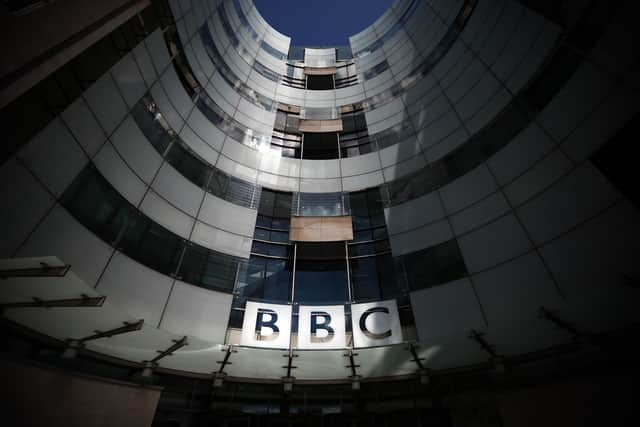How much does a BBC UK TV licence cost, what does it pay for - and can you legally avoid paying it?
and live on Freeview channel 276
Having a TV licence used to be a straightforward process.
When the fee was extended from radio to TV in 1946, you knew exactly which devices your license applied to: television and radio sets.
Nowadays it takes a little more reading time to get your head around the rules on what you can watch without a TV licence.
Advertisement
Hide AdAdvertisement
Hide Ad

The licence fee has been the subject of much debate after the government launched a consultation last year on whether evasion should be decriminalised.
A short history of the BBC licence
The BBC was founded in 1922 and was formerly known as the British Broadcasting Company.
It started off as a radio experiment from a home studio in London by a group of wireless manufacturers and gained its popularity as a daily show with talks, news and musical drama.
In the 1920s, the government took the decision not to allow the fledgling BBC to fund itself using commercial advertising and instead required people to buy a licence in order to receive their broadcasts.
Advertisement
Hide AdAdvertisement
Hide AdThe first wireless licence was issued in November 1923 for 10 shillings (50p), and by the end of that year 200,000 had been issued.
The first combined radio and television licence was issued in 1946 for £2 - before a supplementary licence for colour TVs was introduced in 1968.
In 1971, radio-only licences were abolished, along with the requirement to have a licence for car radios.
The BBC was made responsible for administration of the licence fee as a result of the Broadcasting Act 1990, and the corporation now sub-contracts the work.
Advertisement
Hide AdAdvertisement
Hide AdIn 2015, the government and BBC reached a settlement which meant the broadcaster had to find savings of £800 million by 2021/22.
It also saw the corporation commit to taking on responsibility for the funding of free licences for the over-75s.
The corporation subsequently announced that the free licence benefit would be restricted to those in the age bracket who claim pension credit, because the financial burden of providing it to all those eligible was too great.
What does my TV licence fee pay for?
Anyone who watches or records programmes on a TV, computer or other device must buy a TV licence – along with those who watch or download shows on BBC iPlayer.
Advertisement
Hide AdAdvertisement
Hide AdThis applies to any device or provider you use, including a TV, desktop computer, laptop, mobile phone, tablet, games console, digital box or DVD/Blu-Ray/VHS recorder.
In April 2020, a government consultation on decriminalising licence fee evasion closed after receiving 154,737 responses but plans were shelved to end the fee until 2027 when the current Charter period ends.
In January this year, culture secretary Oliver Dowden said criminal sanctions for not paying a TV licence fee were “disproportionate”.
Viewers can be prosecuted if inspectors find they have been watching, recording or downloading programmes illegally.
Advertisement
Hide AdAdvertisement
Hide AdThe maximum penalty is a £1,000 fine or it could mean time in prison.
The licence fee costs the bill payer £159 a year (or £53.50 for black and white TV sets).
The money pays for BBC shows and services - including TV, radio, the BBC website, podcasts, iPlayer and apps.
In 2019/2020, TV licence fee revenues accounted for around 71% of total income - with 25,527,840 TV licences in force in the UK according to TV Licensing, a decrease of 224,720 on the 25,752,560 in 2018/19.
Advertisement
Hide AdAdvertisement
Hide AdCan I legally stop paying the TV licence fee?
There are steps you can take to legally not pay your television licence, provided you don’t watch or record any live TV.
Most importantly, avoid watching (or recording) any live TV, content broadcast and viewed through a TV channel, or BBC iPlayer - so that you can legally cancel your licence by declaring that you no longer need one.
To do this legally cancel your licence by declaring that you no longer need one, you can cancel your direct debit with your bank and fill in the ‘No Licence Needed’ form on the TV Licensing website.
You should receive an email confirming that your form has been submitted, and you should then receive a letter confirming that your licence has been cancelled.
Advertisement
Hide AdAdvertisement
Hide AdThis letter lasts for two years. The letter may advise that you might receive a visit from a TV Licensing enforcement officer.
After two years, you will receive a letter asking you to complete a new online form declaring that you do not need a TV licence. You will then get another letter saying your exemption has been accepted and they will be in touch in a further two years.
What happens if TV Licensing knock at your door?
If a TV Licensing enforcement officer knocks on your door:
State that you do not watch or record Live TV on any channel on any device.
State that you do not watch or record BBC iPlayer.
Shut the door.
You do not have to speak to the enforcement officers, and you do not have to let them into your house unless they have a police warrant.
Advertisement
Hide AdAdvertisement
Hide AdAn enforcement officer cannot come into your house unless you invite them or they have a police warrant.
What can I legally watch without a TV licence?
Currently viewers don’t need to have a TV licence to watch freeview on demand services such as the ITV Hub, All 4, My 5, UKTV Play or subscription on-demand services such as Netflix, britbox and Disney+.
On-demand streaming services can be watched without a licence, which include Amazon Prime, YouTube, Apple TV and NowTV - but viewers must be careful not to watch live channels.
